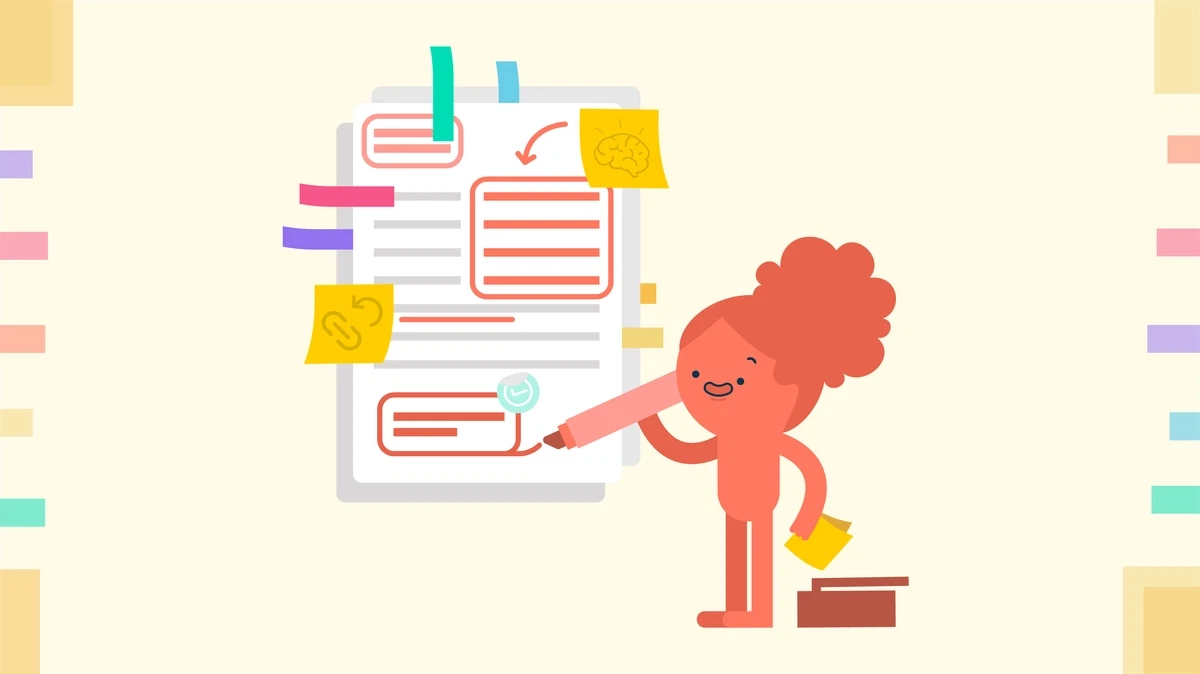So, funny (or not so funny) story: In creating this blog post for you, I’ve learnt that I have been making pretty much all the cover letter mistakes 🥹. So maybe the stars aligned for me for once, and I was meant to write this post so that both you AND I learn to write some decent cover letters that won’t cost us a chance to be interviewed.
PS I’m now starting to realise why I didn’t get interviews for jobs I really wanted … darn you, dreaded cover letter!
OK, enough rambling and feeling sorry for myself, and let’s get right to it. I’ve done quite a bit of research for this post, so the content is a mixture of what I’ve found from professionals, LinkedIn, and podcasts.
The Third Wheel: Why You Should Still Put Effort into Cover Letters
OK, first up, what is this ‘cover letter’ I speak of? If you’re super new to the job market, you may not know, so here’s a brief definition:
A cover letter (or even a motivational letter) is a document that you send with your CV. But instead of rehashing what you wrote on your CV, the cover letter allows you to share more about why you are a suitable candidate for the job in terms of your skills, values, passion, ambition, and personality.
If you create a GOOD cover letter, you will stand out from other applicants. Also, cover letters give you the opportunity to explain things your CV can’t, such as employment gaps or pivoting to a new career. I also read about someone who really wanted a particular job but saw that applications were closed. So she created a strong cover/motivational letter, sent it off, and managed to score an interview!
Just as a quick aside: You need to read the job description very carefully before you apply. Some applications only require your CV (no cover letter) or answering a few questions. However, despite some rather divided opinions on whether a cover letter is necessary, most companies I’ve applied to in recent years have requested one.
So, I’ve read conflicting responses from recruiters and industry professionals on whether your cover letter actually gets read. The truth is, you’re better off having a cover letter than not! One article I read referred to your cover letter as being your spare tire: you should never drive without one, meaning you should never apply for a job without a cover letter!
While researching opinions on cover letters on LinkedIn, I came across a few excellent comments about why cover letters are so important. Here are two of them:
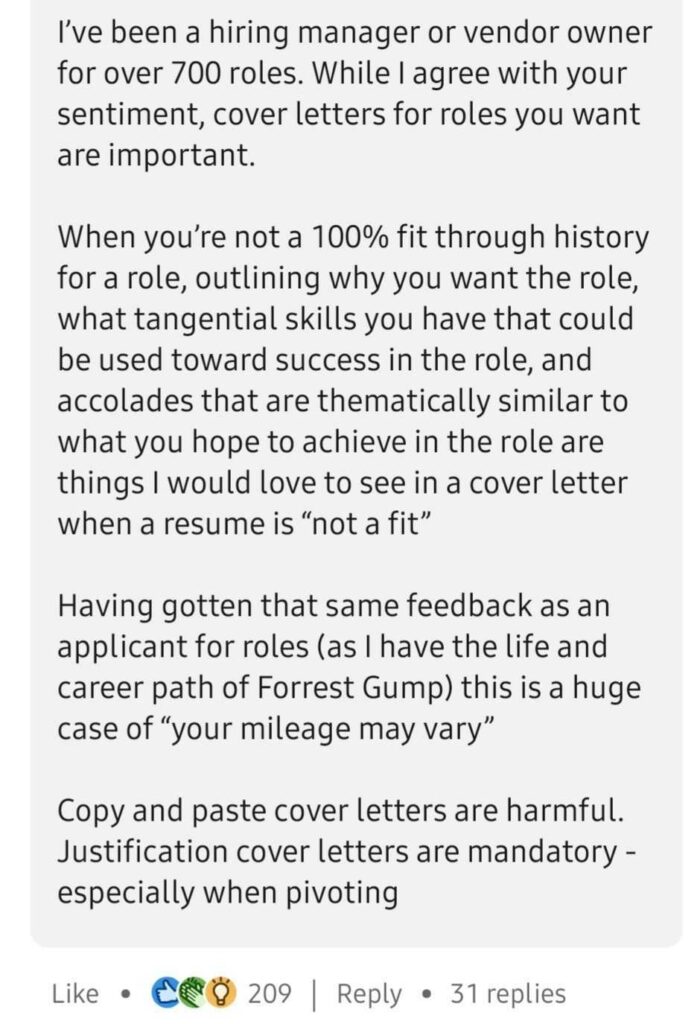
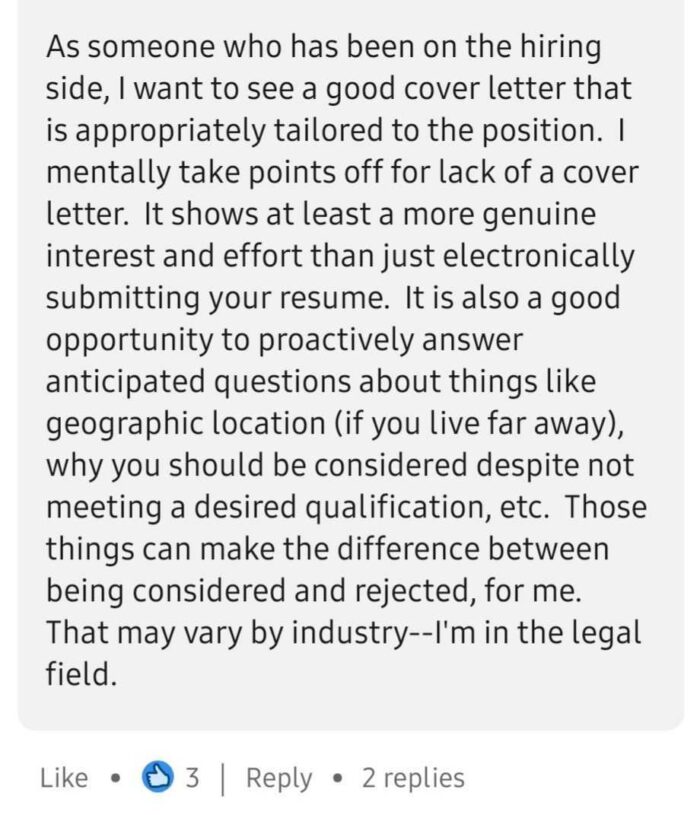
Now that being said … your spare tire needs to be in good condition for it to work, right? Same for your cover letter. You need to have a solid, well-written, well-thought-out cover letter that demonstrates how your skills (hard and soft), personality, and passion (as well as values) align with the company you’re applying to.
And this brings us to …
9 Major Cover Letter Mistakes ⛔
A poor cover letter can harm your application rather than help it.
In a podcast I listened to (‘How to Write a Cover Letter’ from Enhance.training), the host talks about how candidates often waste an opportunity with a generic or poor covering letter. And that’s why the very first major cover letter mistake I’m going to emphasise is this: Do NOT make your cover letter GENERIC. There are tons of generic templates you can find online that use cliché phrases (more on that later), and I know it can be tempting to a) copy what you see online or b) copy and paste from your CV. But do NOT do this because guaranteed, the recruiter/hiring manager will take one look at that hot mess and move you to the rejected pile (stats show that about 80% of applicants don’t even make it past the CV stage!).
And here are the other major mistakes to avoid like COVID-19:
- Not researching the company and the role before you begin drafting your cover letter. Seems obvious, no? But I’ve made this mistake 🥴 because I didn’t research enough. Look at the company’s values and mission. Do they align with your own? If so, you need to express this in your cover letter. You also need to understand the company and what it does – look at industry publications, the company blog, news articles, and LinkedIn. The more you know about the company and the role you’re applying for, the more you can tailor your cover letter and write about what you can offer the company regarding its mission, goals, future, and culture. And even more importantly, you need to understand and express in your letter how you can help the company achieve its goals (as stated in the role you’re applying for).
- For example: ‘With my X years of experience in Y and managing a team of 10 designers, I can help the company achieve Z and overcome the current challenges the design department is facing.’
- Not tailoring your cover letter to the role you’re applying for. As I said, it’s tempting to copy and paste or use the same cover letter with slight tweaks for all the jobs you apply for. But if you really want the job, you need to demonstrate how your skills (once again, both hard and soft skills) match the role specifically (your CV itself can only say so much, so use your cover letter to expand on how your skills are transferrable and relevant to exactly what the job role requires of you).
- You’re using ‘I’ too much or over-inflating. Remember, your cover letter is there to show the hiring team and company what YOU can do for THEM. So talk about the company (its mission, values, culture, products – whatever draws you to it) and how your skills and experience align with what they want. Also, constantly talking about yourself and trying to justify your experience/skills can come across as arrogant (or even insecure). Keep it genuine, and don’t try to be someone you aren’t.
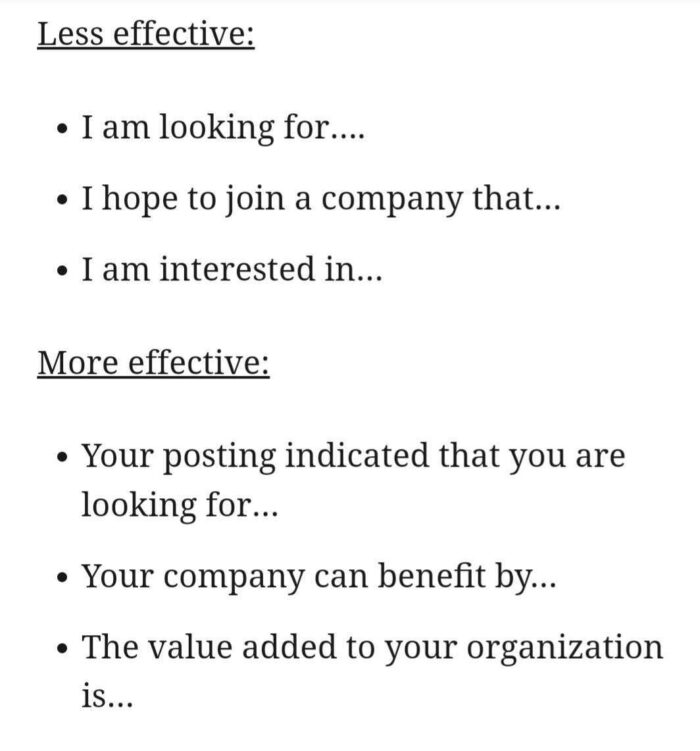
Avoid using ‘I’ too much in your cover letter. Source: Brett Ellis, LinkedIn
- You’re being trite, which is pretty much my middle name. I can be terrible at throwing around clichés and trite words, especially in my cover letter. If you read on, I’ll show you what words and phrases you need to avoid in your next cover letter.
- You’re overdoing it with the praise of the company (or yourself). Sure, you should (hopefully) like the company you’re applying to, but dishing out the praise and how fantastically amazingly awesome the company is will just come across as superficial, fake, and trying too hard.
- You’re underpraising yourself! If you don’t have a certain skill or experience, you don’t necessarily need to highlight that. Rather focus on what you DO have and what you can bring to the table (but don’t use this cliché in your letter).
- You’re giving reasons why you left your previous company – and then bad-mouthing said company. Sure, you can always explain why you’re looking for a new role, but under no circumstances should you say anything like, ‘My previous company and management were terrible.’ This is something you can talk about in your interview (but obviously phrased better!). You can check out our post Tough Interview Questions for more info on this.
- You’re already asking about your salary. NOPE. This is something that should only be addressed in your final interviews. However, just read the application process and its requirements carefully. Some applications do ask to give your required/expected salary range. But you’ll put that somewhere else, not in your cover letter (you usually have a place to answer this in the online application).
- Speling and grammir hasn’t been checked. Yup, this one is a biggie! If you know you’re not the greatest at writing or proofreading, get some help (be it professional – there are companies offering to help you create your cover letter – or from friends/colleagues). As an editor myself, nothing – I repeat, nothing – looks worse than a poorly edited and proofread text riddled with mistakes. And look, while one typo may not jeopardise your entire application, always err on the side of caution and check.your.work!
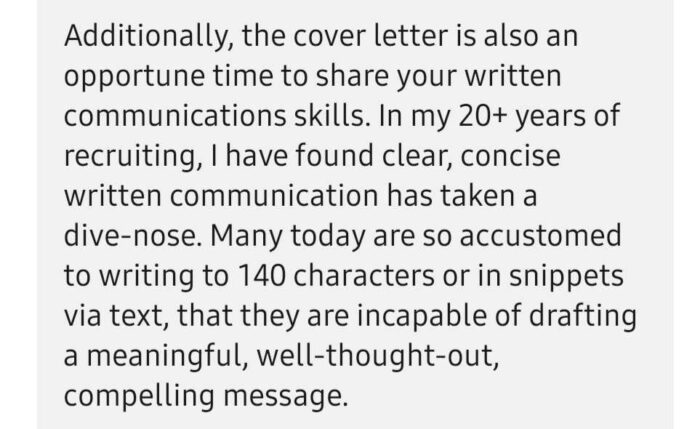
Cover letters (especially if you’re applying for a writing/editing role!) demonstrate that you can form a well-thought-out, coherent, well-structured message.
Common (aka Cliché) Cover Letter Mistakes to Avoid 🙅
They aren’t called common mistakes for nothing! I’m pretty sure everyone who has ever applied for a job in the history of humankind has made at least one (if not all, like yours truly 🥹) of the following mistakes:
- Your cover letter is too long*. If you’re like me (and as you’ll see from the posts I create for the StudySmarter Magazine), I can write for daaayyyss (which also means I am prone to waffling). I’ve always thought cover letters should be longer than shorter, but NOPE! Your cover letter shouldn’t be longer than one A4 page (even better if you can keep it to three-quarters of the page or about three to four paragraphs). Keep in mind the adage that less is more. Get straight to the point – you can even use bullet points when referring to how your skills match the job role. Choose two or three KEY job requirements from the job description and show how your skills and experience are the ideal fit for what the company is looking for. Some extra points:
- Make sure the font of your CV and cover letter are the same (you can use templates – I’ve used resume.io for mine).
- Use legible font, like Times New Roman or Ariel.
- Use between 10 and 12 size font (one podcast said 10.5 is optimal).
- Use paragraphs and bullet points to break up your text. NO ONE wants to read blocks of text. Heck, if you want to bold some things or headers too, go for it!
- Addressing the wrong person. Try your best to find out who the hiring manager or internal recruiter is (often, you can see who posted the job vacancy on LinkedIn), and GET THE SPELLING RIGHT! So if you know the recruiter’s name, say ‘Dear [First Name]’. If you can’t find who to address your letter to, you can go for ‘To the Hiring Manager’. Avoid ‘To whom it may concern’, as this is too archaic, and ‘Dear Sir/Madam’ or ‘Dear Mr/Ms’, as this is assuming someone’s gender.
- You’re too formal**. I’ve made this mistake too. You’re not writing a thesis, so try and keep your cover letter more on the conversational side. I’m not saying use phrases like ‘bro’ or ‘that’s lit’ – obviously not. But I have actually seen cover letters that start with ‘Hey’ where the applicant got the job. In this case, I advise you to assess the tone of the job posting. If the posting has a more formal tone, then you’re not going to start your letter with ‘hey’. But some companies, especially start-ups, can be very fun and require you to have a sense of humour. In that case, make your cover letter reflect that!
- Giving irrelevant info. Sure, this might not be the worst cover letter sin, but this will add to the length of your letter – and probably bore the reader. As I mentioned above, you need to tailor your letter to each job you apply for (even if it’s only a few tweaks here and there).
- You’re cliché. While I do love me a good cliché from time to time, the recruiter/hiring manager will, unfortunately, be judging your book by its cover (letter) 😉. So avoid being cliché with empty words, which we discuss below.
- You’re not marketing yourself properly. Everything in life comes down to marketing if you really think about it. And in a cover letter, you’re 100% marketing yourself. Think about when you see an ad you like – you probably like it because of its catchy title, wit, or story-telling value. When writing your cover letter, don’t forget to include a catchy headline that makes the recruiter/hiring manager want to read on. Just saying ‘Cover Letter of [Name]’ is not gonna cut it (trust me, I know from experience).
- You’ve tweaked your cover letter for a new job role, but you’ve forgotten to change the name of the company, for example. That’s a no-brainer. And it all comes back to proofreading!
* We’ll have a separate post on how to create your cover letter, but to get you started (because time and job vacancies wait for no man), here’s a popular format that, crossing fingers and toes, will get you an interview!
- Opening paragraph: State the position you’re applying for and give a little info about you. Here, you can even make a personal connection to the company – maybe you know someone who works there, maybe you’ve been a customer for a long time, maybe you’ve worked for a competitor company, or perhaps the founder of the company studied the same thing as you. Whatever you do, make sure your opening paragraph is as memorable as possible by finding your HOOK. Your hook is that opening line that draws your reader in, making them WANT to read on. Here’s an example from Badass Careers:

Also, Badass Careers has a free guide of hooks. You’ll need to sign up, but the download is free and super helpful. Here’s one of the hooks from the guide:

- Paragraph 2. In paragraph 2, you can talk about what drew you to apply for this role (if you haven’t done so already in paragraph 1). Was it because of the company’s culture? Was it because you know someone there who inspires you? Maybe you even saw an ad you loved and thought, hey, I love that creativity; I want to work for them! In a podcast I listened to, they gave a really good example of how you can tie your career goals to the company. I’ll adapt the example they gave:
- ‘As someone who has witnessed first-hand the devasting effects of suicide, I am inspired by the work you do for those living with mental illness. I want to use my skills as a [X] to make a difference, and that’s why I’m applying for [Y].’

Nandos in South Africa never fails to deliver with their ads. So if I ever apply to work at Nandos, I’d use one of my favourite ads from them as the hook in my cover letter!
- Paragraph 3 (or 2). Here’s where you tie two to three key skills of yours to the job requirements. Including a desirable trait the company is looking for is also advisable. Don’t waffle – you can use bullet points or even do something like this (example taken from Badass Careers):
- Your requirement: Communication skills. My experience: I have presented and facilitated over 40 workshops this year and have consistently had satisfaction rates above 90% when it comes to my presentation style. (See, you’re SHOWING, not just saying, ‘I am a good communicator.’)

An example of how to write a good cover letter showing how your skills match the job description. Source: Badass Careers
- Closing paragraph. Keep this very short. Say thank you for the recruiter’s time or for the opportunity, and say you’re looking forward to hearing from them and that you will follow up soon. Sign off with ‘Sincerely’ or ‘Best Wishes’ and your name.
** In general, there is no strict rule about how to write your cover letter. Some companies call for a more structured one (see my example above with paragraphs), whereas other companies might want you to go wild, especially if they’re in the creative field. Don’t always believe you have to follow a rigid format. See what the company is about and take it from there.
Gift of the Gab: Words and Phrases You Should Never Include in Your Cover Letter
One of the most common mistakes people make in their cover letters is being trite, overusing adjectives, and using empty adjectives and clichés. For words like ‘very’, ‘amazing’, ‘really’, ‘good’, ‘nice’ – you need to chuck ’em out. And with empty adjectives and clichés, like ‘reliable’, ‘detail-oriented’, ‘hard-working’, ‘team player’, ‘uniquely qualified’, ‘outgoing’, etc., rather show your skills and assets, not tell (and where possible, substantiate what you’ve achieved with numbers!). Anyone can say these things and apply them to ANY job or company!
Next, be sure to burn your cover letter and sacrifice it to the job gods if you ever use the following phrases:
- ‘To whom it may concern’. As I mentioned above, this is outdated and too formal. Opt for ‘dear’ instead.
- ‘I’m confident I’m the perfect candidate …’ (firstly, perfect doesn’t exist; secondly, confident is one of those trite words to avoid).
- ‘I believe’ or ‘I think’. ‘Think’ shows insecurity, hesitance, and redundancy. The same goes for ‘I believe’ and ‘I feel’.
- ‘I would be a good fit …’. This phrase is a notorious bugger. I know it’s tempting to use, but once again, it’s redundant. You’re applying for the job because obviously, you’re a fit!
- ‘Love’. Another trite word. Avoid ‘I would love to work for you.’ There are better adjectives to use.
- Saying ‘I will be a valuable addition to your team.’ This is just wasting space – of course you’d be a valuable addition; that’s why you’re applying!
- Saying things like, ‘You won’t be disappointed’ or ‘Please give me the chance.’ It’s almost like dating when finding a job, isn’t it? If you come across as desperate, the other person will probably run for the hills.
- ‘I hope to hear from you soon.’ Avoid the word hope and be more actionable and confident with a phrase like, ‘I look forward to discussing my skills and qualifications with you further.’
Run for the Hills: Cover Letter Mistakes Examples 🏃
OK, so I am (bravely? stupidly?) going to include some snippets of my most recent cover letter, showing you what mistakes I made.
First off, what do you notice in the screenshot below? Hopefully, you answered that my cover letter is a) TOO long (I had two pages!) and b) there is just a wall of text, making it super uninviting to read (it’s like I haven’t yet discovered what bullet points are).
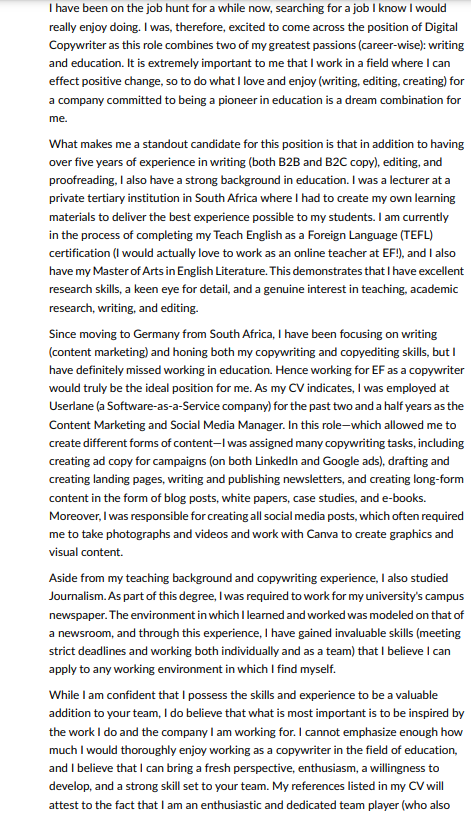
And now for my cringe-worthy language. Look how I’ve used that trite language (‘I am confident’), empty adjectives (like ‘enthusiasm’ and ‘strong skillset’ – I mean, obviously?!), and unnecessary words like ‘definitely’ and ‘truly’. Also, I’ve just rehashed what I said in my CV (i.e. I’ve told, not shown, my skills), and I’ve used ‘I’ way too many times. Also, don’t even get me started on ‘I do believe’ and ‘I can be a valuable addition to your team.’
* I’m just going to marinate myself in shame for a bit. I’ll be back with a new blog post when I’m done.
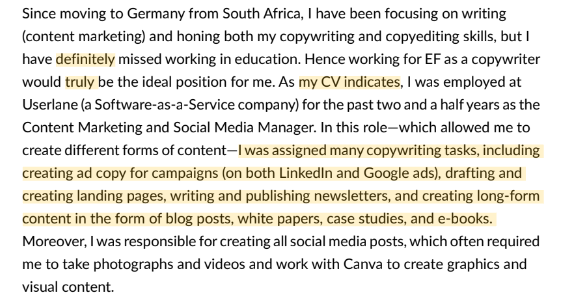

Summary (and Consequences) of Cover Letter Mistakes
OK, if all this was TL;DR (which I hope it wasn’t because I think there are some valuable points in this post to help you rock your next cover letter), here’s a table summarising the ‘cardinal cover letter sins/mistakes’:
| The ‘Sin’ | The Cover Letter Mistake |
| Lust | You can be a super fan of the company, but don’t overdo it with praise! |
| Sloth | Don’t be lazy and generic with your writing. Avoid clichés, empty adjectives, and overly formal writing. And don’t copy/paste your CV into your letter. |
| Pride | Don’t overdo it with ‘I’, don’t over-praise yourself, and don’t pretend to be someone you aren’t. |
| Greed | Don’t mention anything about the salary in your cover letter. |
| Wrath | Don’t bad-mouth another person or company in your cover letter, no matter how wronged you may feel. |
So, I dunno about you, but I definitely learnt a lot from creating this post (and I’ve learnt that my previous cover letters contained ALL the mistakes 🫣). There is SO much info on how to create a cover letter, so go ahead and do some research. I know that you’ll also find some conflicting info (and maybe even recruiters telling you that they don’t read cover letters anymore), BUT one thing is for certain: You should have a well-crafted, creative cover letter JUST IN CASE. Because truthfully, it could mean the difference between landing an interview or heading straight to the rejection pile.
A well-put-together cover letter will boost your application and help you stand out, especially if the recruiter/hiring manager needs extra info or some clarity. Lastly, don’t be afraid to use your cover letter to show how hungry you are for a certain role – if you want it, your cover letter will be the one to show it!
I’ll leave you with one last bit of motivation from a professional on LinkedIn. Good luck🍀!
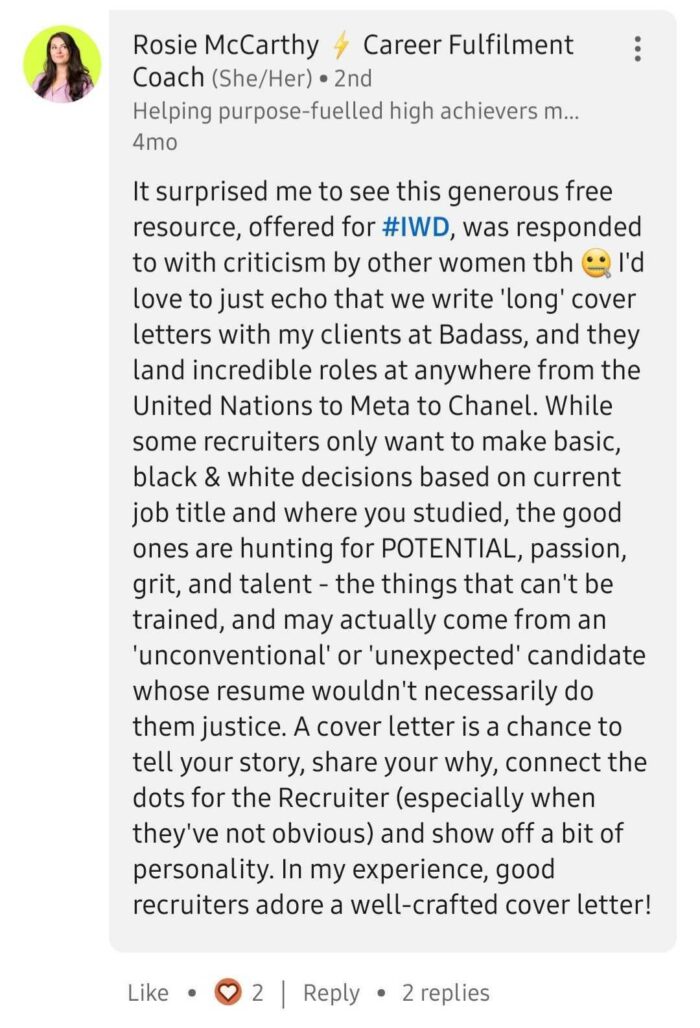
Frequently Asked Questions (F.A.Qs)
The most common cover letter mistake is not writing a good one! In other words, you’re just submitting a cover letter that is super generic, adds no value, repeats what you’ve said in your CV, and uses empty adjectives and clichés, such as ‘reliable’ and ‘hard-working’. A generic cover letter with little effort will definitely put your application in the rejection pile.
The main consequence of a poorly written cover letter is that your application won’t even be looked at, and it’ll land up in the rejection pile before you even get a chance to have an interview or screening call.
The don’ts for writing a cover letter include: creating generic copy and using trite language and clichés, not tailoring your cover letter to the job requirements specified in the job ad, making the cover letter too long (longer than one A4 page), using ‘I’ too much, over-praising the company, being insincere or trying to be something you’re not, and not making your cover letter personal enough/showing the company WHY you’re an ideal fit.
How we ensure our content is accurate and trustworthy?
At StudySmarter, we have created a learning platform that serves millions of students. Meet the people who work hard to deliver fact based content as well as making sure it is verified.

Gabriel Freitas is an AI Engineer with a solid experience in software development, machine learning algorithms, and generative AI, including large language models’ (LLMs) applications. Graduated in Electrical Engineering at the University of São Paulo, he is currently pursuing an MSc in Computer Engineering at the University of Campinas, specializing in machine learning topics. Gabriel has a strong background in software engineering and has worked on projects involving computer vision, embedded AI, and LLM applications.
Get to know Gabriel




